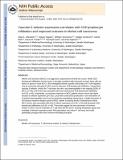| dc.contributor.author | Afanasiev, Olga K. | en_US |
| dc.contributor.author | Nagase, Kotaro | en_US |
| dc.contributor.author | Simonson, William | en_US |
| dc.contributor.author | Vandeven, Natalie | en_US |
| dc.contributor.author | Blom, Astrid | en_US |
| dc.contributor.author | Koelle, David M. | en_US |
| dc.contributor.author | Clark, Rachael | en_US |
| dc.contributor.author | Nghiem, Paul | en_US |
| dc.date.accessioned | 2014-03-11T13:54:01Z | |
| dc.date.issued | 2013 | en_US |
| dc.identifier.citation | Afanasiev, Olga K., Kotaro Nagase, William Simonson, Natalie Vandeven, Astrid Blom, David M. Koelle, Rachael Clark, and Paul Nghiem. 2013. “Vascular E-selectin expression correlates with CD8 lymphocyte infiltration and improved outcome in Merkel cell carcinoma.” The Journal of investigative dermatology 133 (8): 2065-2073. doi:10.1038/jid.2013.36. http://dx.doi.org/10.1038/jid.2013.36. | en |
| dc.identifier.issn | 0022-202X | en |
| dc.identifier.uri | http://nrs.harvard.edu/urn-3:HUL.InstRepos:11879916 | |
| dc.description.abstract | Merkel cell carcinoma (MCC) is an aggressive, polyomavirus-linked skin cancer. While CD8 lymphocyte infiltration into the tumor is strongly correlated with improved survival, these cells are absent or sparse in most MCCs. We investigated whether specific mechanisms of T-cell migration may be commonly disrupted in MCC tumors with poor CD8 lymphocyte infiltration. Intratumoral vascular E-selectin, critical for T-cell entry into skin, was downregulated in the majority (52%) of MCCs (n=56), and its loss was associated with poor intratumoral CD8 lymphocyte infiltration (p<0.05; n=45). Importantly, survival was improved in MCC patients whose tumors had higher vascular E-selectin expression (p<0.05). Local nitric oxide (NO) production is one mechanism of E-selectin downregulation and it can be tracked by quantifying nitrotyrosine, a stable biomarker of NO-induced reactive nitrogen species (RNS). Indeed, increasing levels of nitrotyrosine within MCC tumors were associated with low E-selectin expression (p<0.05; n=45) and decreased CD8 lymphocyte infiltration (p<0.05, n=45). These data suggest that one mechanism of immune evasion in MCC may be restriction of T cell entry into the tumor. Existing therapeutic agents that modulate E-selectin expression and/or RNS generation may restore T cell entry and could potentially synergize with other immune-stimulating therapies. | en |
| dc.language.iso | en_US | en |
| dc.relation.isversionof | doi:10.1038/jid.2013.36 | en |
| dc.relation.hasversion | http://www.ncbi.nlm.nih.gov/pmc/articles/PMC3644376/pdf/ | en |
| dash.license | LAA | en_US |
| dc.subject | Merkel cell carcinoma | en |
| dc.subject | T cell immune evasion | en |
| dc.subject | E-selectin | en |
| dc.subject | Nitrotyrosine | en |
| dc.title | Vascular E-selectin expression correlates with CD8 lymphocyte infiltration and improved outcome in Merkel cell carcinoma | en |
| dc.type | Journal Article | en_US |
| dc.description.version | Version of Record | en |
| dc.relation.journal | The Journal of investigative dermatology | en |
| dash.depositing.author | Clark, Rachael | en_US |
| dc.date.available | 2014-03-11T13:54:01Z | |
| dc.identifier.doi | 10.1038/jid.2013.36 | * |
| dash.contributor.affiliated | Clark, Rachael | |


